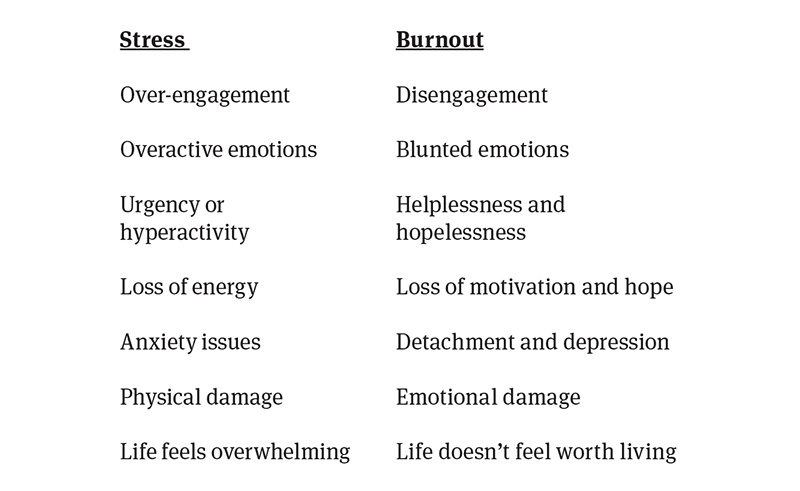By Jerry Harris
All church leaders are dealing with stress right now. Stress can come from every area of our lives.
You might be under pressure, facing big changes, feeling a lack of control, shouldering heavy responsibility, or feeling uncertain about the future. You might be facing multiple issues simultaneously or feeling the effects of past experiences.
Your stress might be triggered by illness, injury, parenting, infertility, bereavement, abuse, marriage, divorce, relationships, or caregiving. You might have lost your job, or be seeking a new job, or just started in a new role. Perhaps you retired recently. You might be feeling the pressure of deadlines, exams, or work strife. You might be moving, dealing with difficult neighbors, worrying about money, or drowning in debt. You might lack the resources or support you need.
Did I find it? Stress is normal and we shouldn’t expect to avoid it. The key issue is this: Are we managing stress in a healthy way. If we aren’t, it can lead to burnout, which is far more debilitating. Here are some differences between stress and burnout:

We can sometimes be so driven by our purpose and passion that we allow massive amounts of stress into our lives. If we are mentally unhealthy when the waves of stress really kick in, we truly risk ending up in a ditch.
Do you fit that description? Are you burned-out right now? If so, that doesn’t mean you’re done. God can help you. Over time, he can take your negative space and make it part of your testimony.
Burnout is a debilitating condition that erodes energy, optimism, and effectiveness. The prevalence of burnout is far greater than the willingness to talk about it or deal with it. Burnout typically occurs in six stages:
Stage 1. Emotional exhaustion
Stage 2. Increased frequency and duration of negative self-assessment
Stage 3. Loss of emotional stability, personal discipline, and resiliency
Stage 4. Isolation
Stage 5. Diminished work effectiveness
Stage 6. Identity impairment and confusion
God’s Word includes many examples of these stages of burnout. Studying Elijah can help us spot the signs of burnout and manage stress.
God called Elijah to deliver his message to evil King Ahab and his even more evil wife, Queen Jezebel. Elijah seemed to always deliver bad news, and he certainly wasn’t appreciated. He lived every day in fear for his life. Consider the stress Elijah faced—he was called out of a simple life to deliver bad news about God’s judgment, and he then had to face the unhappy response.
Elijah’s first assignment: declare a drought and famine that would last for years. (Stress.) God told him to leave the country. (Stress.) Elijah was totally dependent on God, and when the water dried up, he had to go live with a Gentile. (Stress.) He helped a starving widow and her starving son. (Stress.) The son died and Elijah brought him back to life. (Stress.) Ahab sent people everywhere to find Elijah and kill him. (Stress.) Imagine three years of that!
Then Elijah came back and challenged Ahab and Jezebel’s prophets to a duel, and the whole nation turned out to watch it.
After God defeated the 450 false prophets of Baal, Elijah had the people execute those prophets. After that, clouds appeared and it started to rain . . . after three years! What an incredible moment! What a win for God! What a win for Elijah . . . or so it seemed. Elijah was burned out! He was emotionally exhausted.
Compare the stages of burnout, listed above, with the first several verses of 1 Kings 19.
Elijah was suffering “an increased frequency and duration of negative self-assessment.” (He told God, “I am no better than my ancestors.”)
He had “a loss of emotional stability and resiliency.” (He told God, “I have had enough, Lord.”).
He felt totally isolated. He felt he was no longer effective.
He experienced identity impairment and confusion. (He asked God to “take my life.”)
Elijah was messed up! So, what did God do to help Elijah with his burnout?
First, God took care of Elijah physically. God provided food and water to his prophet, and then let him sleep. This put Elijah in a position where he could hear God again. If you’re dealing with burnout, this should be a first consideration. Are you eating right? Are you getting enough sleep? What proactive things can you do to modify your behavior and workload to make that happen?
Second, God reminded Elijah of what He was doing (i.e., the “big picture”). Elijah was experiencing what we might call “mission drift” . . . and we can drift too when we forget our priorities (i.e., the main things). The urgent can overpower the important. We can give all we have to the next thing and then have nothing left for the important things.
Third, God told Elijah to find a ministry partner. Elijah was under the false assumption that he was completely alone and could do it alone. That isolation took away his resiliency and accountability. God reminded him he wasn’t alone . . . there were 7,000 people like him, and one of them needed to be a constant companion. We were never meant to do life alone. Satan strikes when we are isolated.
Elijah was burned out, but he didn’t stay that way. Even though he experienced this incredibly dark time, Elijah is one of Scripture’s greatest examples of finishing well. He is one of only two people in Scripture who never died, and Elijah left an incredible successor, Elisha, who was a faithful prophet to Israel for an incredible 60 years.
So, how do you make your story something like that? You’re going to deal with stress—there’s no avoiding it—but to prevent burnout, the best thing you can do is catch it early. Remember the first stage? Emotional exhaustion. You might feel a loss in vitality . . . emotionally overextended . . . prolonged stress. You might feel responsible for specific outcomes without full control of the inputs. You might have inadequate boundaries for self-care and overriding personal needs to serve others. Here are some ideas:
1. Do a physical assessment. It will put you in a place where you can hear and respond to God better.
2. Find places of personal emotional replenishment. It will help you return to a position of stability.
3. Remember the big picture. Prioritize the important over the urgent, even if it costs you. Find the place where God becomes bigger and you become smaller.
4. Never walk alone.
Your story can be like Elijah’s story. You can do well and finish well.


Great stuff, Pastor Jerry! I’m going to send this link to a few people.